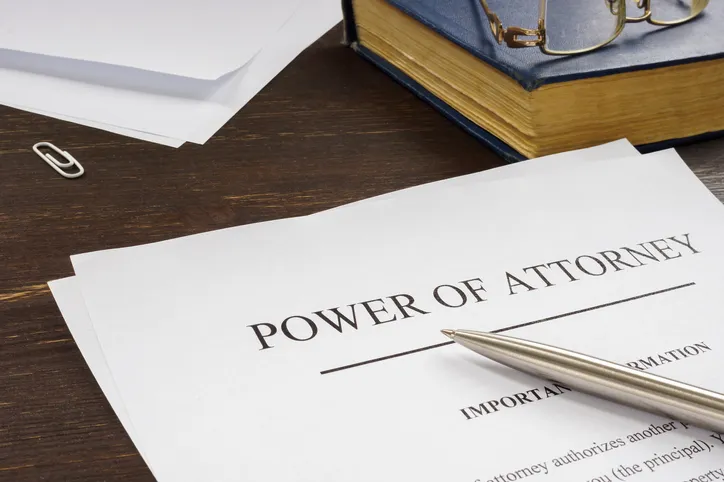Power of attorney (POA) is a legal tool that allows an individual, the principal, to appoint someone they trust to manage their affairs when they are unable to do so themselves. The person appointed is known as the agent. It’s often used in instances where the principal is facing illness or injury, and wants the peace of mind of knowing someone else can handle their affairs in their absence. If you’re wondering if power of attorney can be used to close a bank account, the short answer is “yes.” But whether you’re the principal or the agent, you’ll want to make sure the power of attorney documents are valid and explicitly give the agent the ability to close a bank account in the principal’s name.
Power of attorney isn’t the only way to manage your affairs. For more options, you could consider speaking with a financial advisor.
Creating a Valid Power of Attorney Document to Close a Bank Account
In order to use a power of attorney to close a bank account, the document must meet the legal requirements of the state in which it is executed. These requirements typically include the principal’s signature, the signature of the agent accepting the responsibility, and the signatures of witnesses or a notary public.
In general, here is how you would create a power of attorney document:
- Determine the type of POA needed (general, limited, durable, or springing).
- Choose a reliable and trustworthy agent.
- Obtain the necessary power of attorney forms and draft the POA document, clearly outlining the agent’s authority and any limitations.
- Review the document with the agent to ensure they understand their responsibilities.
- Sign the document in the presence of witnesses or a notary public, as required by state law.
- Distribute copies of the executed POA to relevant parties, such as financial institutions, healthcare providers and family members.
Using Power of Attorney to Close a Bank Account
To ensure the agent has the authority to close a checking or other bank account, the power of attorney document should include specific language stating that the agent has the power to “close bank accounts” or “terminate banking relationships.”
Without this explicit language, the agent may face challenges when attempting to close an account on behalf of the principal.
Here are some examples of language that could be included:
- “My agent shall have the authority to close any and all bank accounts in my name.”
- “I grant my agent the power to terminate any banking relationships on my behalf.”
To close a bank account using power of attorney, the agent would follow these steps:
- Notify the bank of your intention to close the account and provide a certified copy of the power of attorney document. A certified copy is a copy of the original document that has been certified as a true and accurate copy by a notary public or other authorized official.
- Complete any required account closure forms provided by the bank.
- Provide additional identification, such as a government-issued ID, if requested by the bank.
- Address any outstanding checks, automatic payments, or other financial obligations associated with the account before closing it to avoid potential issues or fees.
- Obtain written confirmation from the bank once the account is closed and keep this documentation for your records.
It’s important to note that bank procedures for closing an account can vary from institution to institution.
Closing a bank account could also have potential tax implications or reporting requirements, especially if the account holds a significant balance.
Confirming the bank’s protocol when drafting power of attorney documents can help ensure the agent is fully prepared for closing the bank account. Working with an attorney experienced in drafting power of attorney documents to close a bank account can also help avoid any complications and ensure the process runs smoothly.
Alternatives to Power of Attorney for Closing a Bank Account

While a power of attorney can be a useful tool for closing a bank account, it isn’t the only option available.
One alternative is setting up joint bank accounts, which allow multiple individuals to access and manage the account without the need for a power of attorney. This can be a convenient option for couples or family members who wish to share financial responsibilities.
Another option is establishing a trust account, where a designated trustee manages the assets according to the terms of the trust agreement. Trust accounts can provide more control and protection compared to a power of attorney, as the trustee is bound by the specific provisions outlined in the trust document.
FAQs
Can a Bank Refuse to Accept a Power of Attorney for Closing an Account?
In some cases, a bank may refuse to accept a power of attorney if they have concerns about its validity, if it does not meet their internal requirements, or if they suspect fraud or abuse. If a bank refuses to accept a power of attorney, it may be necessary to seek legal advice to understand your rights under the Uniform Power of Attorney Act (UPOAA).
What Happens to Any Remaining Funds in an Account Closed By a Power of Attorney?
When a power of attorney closes a bank account, any remaining funds in the account will typically be issued to the account holder in the form of a check or it can be transferred from one bank account to another, as directed by the agent.
Bottom Line

POA can provide the principal peace of mind that important matters are handled efficiently and effectively in their absence. If the intent of the POA is to close a bank account, it’s important to ensure the POA documents include language including the closure of the bank account.
Tips for Using Power of Attorney
- Finding a financial advisor doesn’t have to be hard. SmartAsset’s free tool matches you with up to three vetted financial advisors who serve your area, and you can have a free introductory call with your advisor matches to decide which one you feel is right for you. If you’re ready to find an advisor who can help you achieve your financial goals, get started now.
- If you’re considering whether to set up a power of attorney versus a trust, it can be helpful not only to understand the different types of trusts, but also simple vs. complex trusts.
Photo credit: ©iStock.com/designer491, ©iStock.com/RichLegg, ©iStock.com/Sladic
